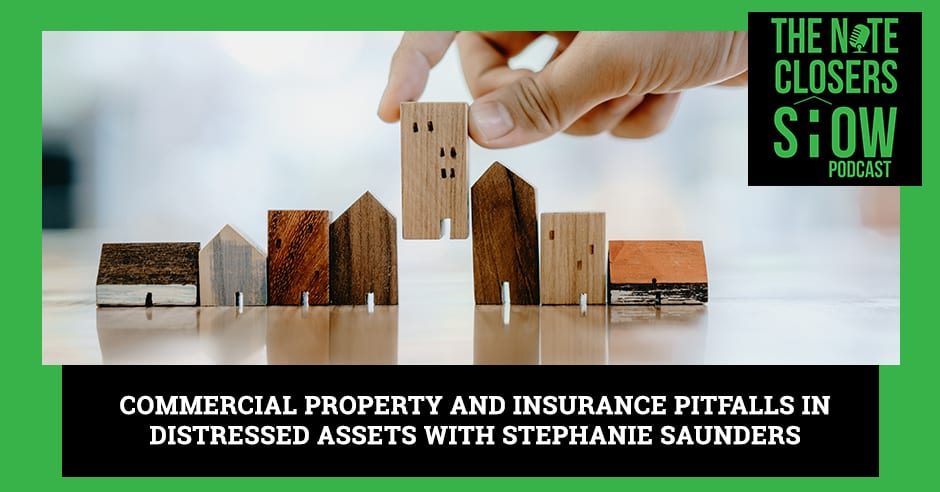
Getting the right type of insurance has become synonymous with personal protection, and that’s pretty reasonable. Still, many insurance pitfalls lurk around that may devastate your assets when you are caught off guard. Helping out in detecting and addressing such problems is Stephanie Saunders from United Claims Specialists. Sitting down with Scott Carson, she also talks about her professional experience in note investing, detailing the most important things to take into consideration when buying occupied or vacant commercial properties. Most importantly, she shares her philanthropy endeavors as the Founder of Suskind Foundation, which helps various communities respond and recover from all kinds of disasters, both natural and economic.
—
Watch the episode here
Listen to the podcast here
Commercial Property And Insurance Pitfalls In Distressed Assets With Stephanie Saunders
I’m excited to be here and even more jacked up. I’m excited to have somebody that I connected with a while back on LinkedIn. It’s why social media is so important. You never know who you’re going to reach out to and connect with in one phase or facet, and never know where they’re going to go. I’ve been looking at my shows and looking at my content. I’m getting questions from people that say, “Can you have somebody to come on and talk about property insurance, force-placed stuff?” I was like, “Let me look. I know exactly the person that I’ll bring on here.” We’re honored to have the person in charge of business development. The nationwide badass who understands the note business. She formally was a note trader. We’ll get more into that later on because that’s where we connected, but we’re honored to have the lovely Stephanie Saunders joining us from Miami from United Claims Services. What’s going on, Stephanie? How is it going?
It’s great to be here. Thanks for having me on.
No problem. For those out there, we’ve got real estate investors that are both on the residential and the commercial side of the business. Before we get into that, share your journey, how you went from where you’re at to where you’re at now?
I originally was working for mortgage servicing companies during the last recession. From that, I met a lot of people who were in the note trading world. I was dealing with a lot of different investors who were servicing the note trades in the bulk area. It’s funny to me that I always stumble across people now that want to get into buying notes. I’m like, “Do you know how to service notes? You need to understand what’s going on before you start buying notes.” I’d love to pick your brain on that. After that, I got into wanting to help people protect their investments. It’s understanding that even though you’re an investor, you can still lose out on many levels. It’s not just a market flop. It’s a fire. It’s a bad incident where you were underinsured. I found it was something to be passionate about and uncovering money for people.
I see somewhere where you started a foundation to help people that are going through it.

Insurance Pitfalls: If you buy something, and then six months in you have an incident, make sure you’re properly insured.
During the pandemic, I started The Suskind Foundation. We started making donations for hand sanitizer and different things, but also helping people find jobs and offering brands so that we can help people change directions. The reason I’m passionate about that is because I originally was going to be an attorney. Instead of going to law school, I could only get a job in the foreclosure world. That was how I got started on that distressed asset journey. I ended up here, here we are again, people losing their jobs. I’m like, “You’ve got to shift.” I want to help promote that idea.
There are enough people out there that need it. I saw somewhere that there are over six million homeowners and renters looking at potentially being evicted once everything kicks off once that executive order expires. That has a big impact not only for the renters and the people that live in the property, but also the property owners as well.
That’s also scary. Have you been paying attention to the foreclosure trends at the moment? From an investment perspective, it’s the same as it was in ‘08. We’re all watching and waiting with our mouths open because it’s time again possibly, but I feel like it’s going to be a much different market. It’s also a scarier market because people didn’t just take out that loans. Now they’re in a bad spot. I’m not clear. I’m following. We’re seeing some counties are opening back up their foreclosure processes. Do you have any insight on that?
It’s different from state to state, county to county. It all depends on who’s passing the buck. I find that the governors don’t want to be the bad guy. Where you’re at in Florida and the same thing here in Texas, they’re leaving it up to the mayors to make the decision. If you look at what’s happening with what they’re talking about us shutting down again for another 4 to 6 weeks, that’s a whole other wave of distress and people can’t afford that.
In the commercial space, I’m seeing that people are running to dump shopping centers, which was surprising to me. When you think about Publix, they’re doing better than they ever did. Everyone’s stacking up on home goods and food. It’s going to be an interesting little bubble that we’ll see. It will be much different than we’ve ever experienced.
One of the things that we are seeing from our conversations with bankers here and the phone calls I’m getting back from leaving messages is it’s that small-balance commercial stuff, that $5 million and below that’s clogging up the bank. How do you approach that from an insurance standpoint if it’s a distressed asset where somebody is still operating or it becomes a vacant asset? You know what they say, 50% of all malls are going to probably end up closing, hotels are struggling, restaurant space. How do you guys cope with the ever-increasing vacancy or empty factory that we see across the country?
What’s interesting is that we do something different in the insurance world. I got into this because I was passionate about helping people when they have an incident. It was more that investor side of it because all of these note buyers are typically of an investor mindset. They’re buying assets to make a profit. That’s the goal. When I originally started this, it was because I had a large client when I was in corporate at the mortgage servicing side. They had all these bank-run properties that now had force-placed policies on them. They had an obligation to maintain during the field services aspect of it. It’s the field services division where they have to maintain the property.
Property preservation side, especially as we get into the winter months, making the winterization, making sure you don’t end up with an inside water feature or a skating rink if you’re north of the Dixie Line.
It’s so much more than that too. It’s vandalism. It’s not cutting the grass. It’s overgrown trees. If you’re in an HOA. I know a lot of banks at the time, they had 50 homes in an HOA community. It was massive. They were getting slapped with fines. Anyway, they were having an issue with filing property damage insurance claims. They didn’t know how to handle it. There were several larger chop shops that were doing them for the banks, and they were leaking money. I saw this as this strange opportunity to explore what public adjusting was. Most public adjusting firms don’t want to take on this massive amount of business because they’re not giving it that proper care.
From our perspective with insurance right now, insurance is taking the position that they’re not responsible for loss of business use or business interruption because COVID is a non-property-related issue. It’s a fine line. There are some states or some attorneys who are trying to pursue lawsuits. It’s not working out for them but when you have a property damage claim and it’s vacant, you can’t file unless it’s only been like a four-month period. If it’s vacant for six months, they’ll tell you that you have no claim. You have no rights.
This is a scary thing. It’s one of the things I love talking about when we’re teaching our investors and our students is go after the occupied assets just for that alone. I bought enough vacant assets. They got vandalized. I lost a lot of money up in Chiraq, as I like to say Chicago, and that’s a whole different story. That’s the same thing. We’ve had insurance. I was like, “It’s a vacant property. It has been vacant for longer than four months.” “You don’t have a claim.” I’m like, “How am I supposed to protect my investment?” What counsel do we give to those looking to take over assets like that, those vacant properties that they can pick up for a huge steal these days?
What’s unfortunate is when you buy something that’s as is and it’s vacant, you’re going to be assuming whatever damage is there already. If you’re getting a steal, you’re getting a steal, that’s it. Be happy with that steal. If you buy something and then six months in, you have an incident, make sure you’re properly insured. You want to buy a shopping center or a multifamily, and then you didn’t pull out the right insurance and you have some small incident that could cost you upwards of $250,000 depending on the size. That’s not a wise investment strategy.
What are the primary asset classes that you are insuring these days? Do you do single-family homes or more commercial stuff?

Insurance Pitfalls: The best time to make a purchase is right away because you’re getting below market, which has not been seen in a long time.
We are not an insurance provider. We fight against the insurance provider. We represent the investor who pulls out the policy against their carrier when they have an incident. We’re a little bit on the dark side, some would say. We like to fight the 800-pound gorilla though. I exited that corporate matrix. I followed my passion and multifamily investing and note trading. I got into this wanting to help people. Our particular bucket is the larger losses. We do a lot with an organization called ICSC. It’s the International Council of Shopping Centers. We do a lot of that commercial business all over the US and then student housing and multifamily, HOA communities.
Those are definitely varied, especially on the college housing side, student housing side. That’s taken a big hit here compared to a lot of your multifamily side.
How many people are not in school? Many colleges are pulling out and it’s a little scary to say, but I wonder what’s the future of college? Is it all going to be online just like all of our interviews now? Everything is online.
It’s hard to say. I am friends with a college journalism professor. She’s been trying to get her professors to go online to be able to enable kids instead of having a long commute, and a lot of the professors are like, “No.” Now that they’ve been forced to do it, they’re like, “We can get rid of some staff.” We can save a lot of costs by not having a physical classroom anymore and transition to anything.
What do you think about some of these foreclosures that have happened on the high level or more like purchases in New York City? I know that there was an Apple store that sold to someone and they’re going to convert it completely into a residential space, which is mind-blowing to me. That’s going to happen a lot.
You’d look at that with the numbers being out there that 50% of malls are going to close. I’m here in Austin, Texas, a gorgeous spot but a couple of years ago, we’ve had a major mall close. We’ve got a new mall on the North side of town here and it’s been around for a while. It’s by Simon Properties who’s taken a difficult side of things, but you have to look at that. I’ve seen people taking a look at the big box stores and converting them to self-storage facilities, taking something and turning the top level into an executive office. It’s smaller stuff or turning it into multifamily if they have the availability too. You have to pivot with what the market needs. Here we need affordable housing more so than anything. We’ve seen that with hotels being converted to short-term rentals for 12 to 24 months until the market comes back. It’s an opportunity. You’ve got to know how to make lemonade out of lemons.
On so many levels, for sure. I have a question. What do you think is going to happen with the note world based on all of what we’re looking at?
My spidey sense has been telling me that commercial’s been overpriced, and a lot of things have been overpriced. We couldn’t keep seeing it arise. From talking to bankers on a weekly basis, when I start seeing things like hotels selling at $0.20 on a balance. New York had a major hotel, $260 million loan on a 13,000-room hotel. The fund that owned the note was willing to sell it for less than $0.20 on the dollar. The note space in the commercial space, specifically that smaller balance stuff, it’s what’s clogging up the bank’s books these days, but there’s an opportunity if you know where to look. On the residential side, you’re going to have government-backed loans. They’re going to continue to kick the can down every six months.
They will give you a forbearance and delay things for six months. The biggest opportunity on the residential side is buying the second home loans or the investor loans that aren’t government-backed secured. There’s still a big gap between what the banks don’t want to take a loss for that and what the investors want to pay. It’s not 2008 yet. There’s a gap between that and this is also on the commercial side. The banks were waiting to see how we’re going to get bailed out. That’s going to affect a bunch of dominoes on their books.
The thing you look at too and I bring this up, and that’s why I asked about vacant property. You see an ever-increasing amount of for lease signs everywhere and that’s the thing you have to look at. It’s supposed to be increased or decreased by another 20%, even through 2021 too. You’ve got to have that cash and the team in place. You’re going to take something over and make it suitable. If you’re counting on market rents to be what they are in 2021, don’t expect that you have to drop the rent right back down quite a bit.
We had some condo investments in South Florida and the values are down by $200,000 in a four-month period of time. It’s unreal. It’s also crazy because in New York City, the values are going down. It’s Wild West, but they’re all coming here and snatching up these condos at the cheapest they’ve ever been. It’s a weird space to be investing. If you’re buying right now, you’re good because you’re getting below market, which we haven’t had in a long time.
It’s all about knowing that existing market and I’d be willing to look at it. Miami has always had a lot of investor money coming from outside areas. If you look at the foreclosure trends, one is in Miami beach. It’s higher foreclosure rates, all million-plus homes on their condos. That’s the biggest hit, the new builds. That’s the thing you look at. New York has a reduction in price, but if you look at the rural areas, the outside of the town, the properties are going to continue to rise as people move in that area.
The number one topic right now is that all these rural areas are going to be prime. The fact that maybe you don’t have to make such a commute going forward. You only need to go to the office two days a week going forward because companies are realizing that you can do so much from afar. Now it’s like, “Who wants to live in a city?” It’s not about being so close to work. That’s going to be interesting to watch.
When you’re looking at a conversion on our property, like we were looking at this downtown executive office building, 7 floors, 110-plus doors that converted from an executive office suite to self-storage. They build it all up in less than two weeks because all other buildings or offices are closing. They were storing all their furniture in there for a period of time. How do you evaluate and look at a lot of that stuff? I know that you’re going after the insurance companies and stuff like that, but if it’s something going through a transition period, are you guys like you’ve got to get on the ball to make sure this is rock and rolling for you, or are you running into delays?
Are you saying from an insurance perspective? If someone is purchasing something that was once a hotel and is now going to be a mixed-use storage unit or whatever, it doesn’t matter what you’re utilizing it for. From that aspect, when you buy something, you want to make sure that you have the right insurance. I don’t even think that your insurance carrier cares what you’re using it for unless you’re taking out a business policy where you want to cover your income and whatever machinery you have. It’s more like your dwelling coverage.
That’s the thing that is so interesting these days is if it’s not operating, it’s not cashflowing, then your NOI has reduced, your values drop, the cap rates drop. It’s a slippery slope right now for banks. They don’t want to be above 60%, 65% LTV. They’re not at 70%, 80%, 90% because values drop as income falls or inventory increases.
What is also important for people to know when it comes to the insurance world is you can buy something as an investor, it’s your home, whatever it is. If you buy it and there is something that is found during the inspection phase, like you find that there’s a huge water leak issue or a roof problem or whatever non-sexy problem there might be. You can have your seller reduce their price and purchase it, or you can tell them that you want them to file a property insurance claim and transfer the rights to you, which I wasn’t aware of in the beginning. It’s totally legal. They give you access to their prior policy and then you’re fully covered. If you buy it as is, then you insure it with a new policy and you are insuring it with all this prior existing damage.
We see that on the note space, especially since we don’t often get interior inspections on a lot of what we’re buying. That’s the scary thing in a lot of cases. With what you guys are doing, what’s been one of the most interesting things with your guys’ business that you’ve seen that has shocked you with everything going on?
The shocking thing is how many people assume that they were going to have the loss of use claim coverage. That’s been mind-blowing. It massively affected businesses that cannot operate and losing by the millions, and there is no recourse to them. It’s been shocking. I don’t want to do the sob story or play the little violin, but at the same time, I feel like there should be some responsibility from the 800-pound insurance gorilla.
A little bit, especially since they’ve been making money for so long, hand over fist in some cases, and especially if somebody has not filed claims for years.
Sometimes claim filing is once in a lifetime. When you’re an investor, it’s funny because now when you get more educated on this in what your rights are when you’re owning a physical dwelling, you realize, “That’s covered under my policy.” You start to understand, “The carrier offered me $200,000.” It’s probably worth $800,000 because they’re never going to come in and give you the full value. You may end up filing more frequently as you buy more property when you get educated on this. For most people, it’s once in a lifetime.
That brings me to a question there with what you guys are doing. Could you give me the top 2 or 3 things that you’re assisting your clients with on a regular basis?

Insurance Pitfalls: When you buy something, make sure you have the right insurance.
The most commonly filed loss surprisingly is a simple water loss. You have a multifamily building and the top floor has a water leak. It’s a simple something with the shower and it goes all the way down to the other unit and the common area. Some people think, “I’m going to own a dryer, a blow-dry machine. I’m going to put the blow-dry machine in every hallway and we’re good, no problem.” Six months later, everyone is sick and has some infection because they’ve been breathing in mold, and now you’re liable. You have to rip up everything, start all over and probably relocate your tenants, and it’s a disaster when you should probably right away get remediation, make sure you have coverage and resolve it. On that topic, insurance companies reduced drastically the cap on what they give you for water losses because they’re the most commonly filed ones. Now they usually cap you out about $10,000 of coverage, which is nothing. It will cover half of the room. You have to pay about $100 a month more for $80,000 of coverage. It’s very inexpensive but it ends up being a huge thing for you in the end.
Especially if you’re in different areas of the country too. I think about Houston. It floods there all the damn time with a half-inch of rain. It gets hit by hurricanes and that’s one of the biggest things. That issue happens all the time in that area.
I don’t want to complicate it too much, but I’ll tell you that flooding isn’t even covered under your homeowner’s insurance policy. It’s a completely separate FEMA-regulated policy that pays minimally, so you have to know all this stuff. When I started buying multifamily, I had no idea. I thought flood insurance is all I need because I’m in Florida. I don’t need anything else, but you need to be careful.
We’ve got some friends that bought a property. They went with the normal insurance. They didn’t add that extra policy and now the costs from the damage are killing the deal. They’re in the red instead of being in the black. You’ve got to know what’s going on with that market.
It’s all about the investment. Even when you’re buying your baby that you want to live in or whatever it is, you still have to look at it from the investment perspective. You’re hoping they’re always going up.
Question for you. You live in Miami and there’s talk about Miami being underwater. It’s starting to flood. Let’s talk about that. What’s your opinion and thoughts on that?
It will happen but I don’t think it will happen in my lifetime. I hope it doesn’t. I think we do enough, but we’re buried every time it rains. One day, you’ll probably see Miami under. I don’t think that there’s enough you can do. They’re constantly building up and we have erosion protection but you can’t fight Mother Nature that hard. I have a question for you though. Many people that I know, they’re interested in discussing notes. What do you say to the average person who is trying to learn about notes? How do you help guide them into breaking the barrier into doing their first deal?
The biggest thing is to make sure you buy right. You’ve got to know the value, you’ve got to know the title, you’ve got to check your taxes. If the price makes sense, buy. You’re going to learn more from pulling the trigger on the first deal than you will from anything else. Maybe you’re not going for that million-dollar condo. Maybe you’re buying a $30,000 property in Columbus, Ohio or something like that. That can make sense. Trust but verify. Never trust what the value of the seller tells it is. Double-check it with servicing companies who’ve been collecting the payments or handling the legal side. You’re going to learn more about taking action. I’ve been teaching note investing for over a decade now, and there are a lot of steps that you go into. You have to come from a different mindset. That’s one of the biggest mistakes we see with investors. They’re used to watching flip this house or flip or flop. It’s a totally different world. I’d love to come back to that because you’ve been on that legal side beforehand. Was that a big eye-opening experience for you going through that?
For sure. Why it’s interesting for me is because I have this completely different perspective with notes. I know the backend, the servicing side, all the platforms and how it works. When I was doing the note trading, it was bulk trading. It was by the thousands but these companies were more like REITs and organizations. They were servicing the notes. It’s such a different market. It’s almost hard to flip from that side to the consumer side and say, “How do I look at this from a fresh set of eyes and get rid of all that cloud?”
The thing is, many people get so tied into the real estate side. I’m picking up paint and carpet and rent rate. I’m like, “The banks in the note space aren’t in the property management space. They’re in the cashflow space, the note space.” The thing is you don’t pay, you don’t stay. The biggest mistake I made in my first two years of business was I approached it like that. I was going to foreclose on everything. I should have been doing loan mods initially with people to start having that cashflow come in immediately, not having to fork out servicing costs all the time for nonperforming or legal costs and then repair costs. If someone is willing to live in the property, I should have been a little more willing to work with them initially.
That’s the biggest mistake because you end up on your ass because of all the legal fees and servicing costs.
People don’t realize that. I’m like, “You’re not in the property space.” I call it the OTSC syndrome, Oh, That’s So Cute. Don’t do that. Look at the spreadsheet, know what your exit strategies are, and know that it’s going to probably be 1 of 3 strategies. We did a webinar to our students about taking a look at the spreadsheet, running your numbers and falling in love with numbers versus the property. That’s the same thing. I want to get up into commercial notes too. There’s got to be a different mindset on that as well too for you. You mentioned loving and diving into multifamily investments. How did you make that transition into that?
It all comes back from my making a good thing out of a bad experience. Getting a job during the last recession led me to a full-on 360-degree view of the distressed market from the attorney side, from the servicing side, from the lender side. I realized how easy it was to dive into multifamily if you do it wisely. You get a good deal on multifamily. You’ve got six units or more that you are now bringing income in on. You insure it properly. It’s funny, we say in my industry now with the property damage stuff, every person that’s in this space that’s fighting the 800-pound gorilla typically started with an incident of their own. They bought something like I did, didn’t insure it properly, had to pay, major mistake, and then you delay. You keep it or you dump it right away at a loss. You’re waiting two more years to recover and make a profit. Multifamily is the best. It’s very lucrative and profitable. We’re going to see a lot of multifamily leaving rate deals right now.
Especially in the student housing aspect of it. They say the national average is running 85% on the rent collections right now. It’s less than that on the student housing side. That’s the one I asked that the banks realize the value out of the loan. They see everything’s selling above value. Here’s the thing. When you get into the multifamily side, the idea is that I want to take something down, regentrify it, increase the rates and get refinanced out in three years. The opportunity is going to be exactly like it was in 2008, ‘09 and ‘10. You had all these people that bought in, financed it, syndicated it with the idea that they’re going to be able to cash out. I don’t think those loans are going to be there to cash out in the next 12 to 24 months.
I’m already seeing that people are trying to run, but the problem is that there are many people with their mouths open right now that have been waiting for the inventory to become available that their bidding wars are starting. That’ll be around for the beginning of this, and then as you said, the twelve months or so, it will be a little more competitive.
That’s also the nice thing about being in the note space. If you can deep tap in, you’re going to see deals 6 to 12 months before it ever goes to that REO or hits the foreclosure auctions or that aspect of things. That’s what I’m going to ask you next. You’ve got your experience. What are the deals that if you see something, you’re ready to cash in and get rock and rolling? What’s your sweet spot?
For now, I want to be local. Eventually, I’d like to be in some other. We have offices in other locations. We have an office in New Jersey. We’re there often. We have one in LA. I’d love to buy something there but I want to be in a sweet area in South Florida. When I got into this, it was already gone. I was working through the whole recession and foreclosure. I learned it but I didn’t get the opportunity to grab a steal. I’m waiting for something that is I know definitely way below market and in a good area. I’m going to jump all over it. Maybe a little bit of rental. That’s what I’m looking for.
I don’t think we’ll see the days where you can pick up Miami Beach condos for $5,000 or $10,000 by buying the note and then having to wait two years to foreclose. I wish I could go back and buy more.
They won’t be that sweet, but they will be sweeter than they’ve been in the past few years.
I made a lot of money and bought a lot of stuff in Southwest Florida, Cape Coral, Naples. Lehigh Acres was a valuable area too, and Fort Myers. That is a valuable spot too.
I would consider that a sweet spot for me. If I could find something that was multifamily in that market that was the right price that’s not just sitting there, I would be all over that too.

Insurance Pitfalls: If you buy a property as is, you are basically insuring it with all its prior existing damage.
Are you looking to raise capital where you put a fund together, raising capital, using your own funds, or other investors you get?
Maybe I would do that one day, but for now it’s just me and I’m using my own capital. I’m open to it. I don’t want to say bad things about anybody, but Miami is not a very high working place. There’s not a whole bunch of professionals here. If I found the right little group of people, maybe I would consider it. As I say, local, I’ll stay so low.
I’ve had a conversation with a group out of Florida that’s financing debt purchases, which I found interesting. They’ll finance up to 75% of the note purchase price as long as it doesn’t exceed 50% of as-is value. I was asking, “Are you looking for more commercial? The minimum loan amount is $2 million. That means if you’ve got $500,000 or right around there on a $2 million property, you could come in and do pretty good stuff with it.
They’re doing a lot more than I’m looking for like 1 or 2 things. They’re trying to buy up the whole state.
They weren’t that far yet. They’re like, “We love hotels.” I was like, “That could be a possibility,” because there are enough of those hotels on South Beach or other areas in Miami.
South Beach is going to be a tragedy. I would say it already is, but with what has happened, it’s completely out of commission. People ask me all the time, “What’s going on with COVID?” I’m thinking about whether I believe what’s on the news, but what I’m seeing is there is no real movement in Miami Beach. There are no hotel accommodations. No one’s coming here. They’re going to be out of commission for years.
It’s the same thing up with the 91 all the way up to Orlando. Orlando has been one of the hardest hits. Orlando was number three. LA was number one. San Diego, number two, as far as hotel delinquencies. Miami was like 4 or 5, which is ridiculous.
We’re seeing some foreclosure starting in the commercial, mixed-use residential, but there are hotels right there.
That’s the thing that’s going to be hitting the market. It’s the commercial foreclosures. The REOs are going to be around for a while. It’s going to be well for you to tap into the note space. Are you tapping in? Are you reaching out to any of your cohorts and saying, “Have you got anything on your portfolio that you want to move?”
Some stuff comes across my desk pretty frequently. When there are packages that are being sold or traded, then I do have lots of people that are interested. I haven’t been diving in, but if you’re looking for some insight info that you don’t have, which I’m sure you have all the same info as me, but I’d be happy to share it with you.
I’m always glad to see some stuff because we’re getting more phone calls and email backs.
People are wising up, listening to you educate on how this works and make a profit on it.
The funny thing is that even the bankers I know are like, “We know we’re going to have to move something now.” Florida Capital Bank, I was talking to the asset manager there and he was like, “Everything we have is that small-balance commercial, small multifamily, small offices, small stuff like that. We haven’t got the green light to start selling yet because the board is waiting to see what’s going on.” I’m like, “I hope I’m on your speed dial list.”
Do you think that the GSEs are preventing everyone from moving forward? Yes. It was because they set the precedent. They’re going to follow. They know the private lenders could do something, but how do they look then?
It’s like a hurry up and wait kind of thing. Let’s see what happens up with Trump or Biden, what’s going to be their thing, and then it will all roll downhill from there. I’m fascinated with your foundation. Are you working with people there in the South Florida area or other areas of the country?
What’s amazing about this foundation, especially during this time, so many people want to find a way to give back. Even if they’re not in a good position, but just do something to be there for people. You never know who’s listening to you and what impact you might have on someone’s life. We have several people that are in New York and in Texas that are mentors and therapists. They are offering their services online. We’re pairing them up with people who are looking for mentorship, whether it’s related to career success or what to do right now or if it’s counseling because they’re having so much grief. We are not just focusing on Florida. We’re going wide in that mentor world, which has been rewarding. Many young people are like, “I finished college and I was going to start working in commercial real estate. Now I don’t know what to do.” I partnered her with a couple of people. We’re trying to do whatever we can to help people keep going. You’ve got to pivot, and there are a lot of good people out there that want to help.
We see that here in Austin, we see people that have an MBA that are trying to get a job, that are waiting tables or bartending and that’s been shut down. They’re having to try to figure out whatever they can do to make that extra money to pay the bills or to eat. That side hustle has gone away and they’ve got to figure out something.
Also, there are many places right now that are doing granting for continuing ed for a course. Let’s say you’ve been out of school for a little while. You had an MBA, and your entire career in banking has gone flop. Now, what do you do? Do you get into social media marketing? How do you shift yourself? You’ve got to find the market that’s thriving but there are grants available to offer you a free course so you don’t have to spend the money on a course. We get into that whole discussion of, is school the way to go now? I won’t open that door.
What is the best way for those that are reading from Florida, LA and everything in there? If somebody is looking to get involved, to find out more information about that and how they can plug-in, resources, what’s the best way for them?
For the foundation, I’m all about LinkedIn marketing right now. I don’t know if anybody else is on that train but I have met more business professionals and people looking to do investing and doing mentorship stuff on LinkedIn than I ever would have imagined since the pandemic. I’ve been on there for years. It used to be a resume platform. I’m on LinkedIn, Stephanie Saunders. We have a website also for the foundation. It’s TheSuskindFoundation.org. As far as the property stuff, if you’re investing and buying actual property, you want to make sure you have the right insurance. If you don’t have an incident, you don’t need somebody like me but you should always have someone represent you if you have an incident. If you don’t, just make sure you have the right insurance and we’ll help you make sure you do. We’re not writing policies, but we’re happy to review what you’re taking out for your investment to set you on the right track so you don’t have a problem one day.
I’m glad you brought that up. Don’t you mind if people reach out to you to do that?
No, I’m happy to help. I’m all about being an advocate. I like to help people. I like to make money too. I’m not trying to give people free things, but at the same time, everybody needs to know what they have a right to. I’m happy to always give free advice when it comes to making sure what you pulled out.
I’ve got a buddy who’s an attorney who sues a lot of insurance companies as well for the malpractice and stuff like that. He’s like, “There are a lot of things you don’t know.” It’s different than buying a single-family home. When you start taking it to a different level from residential to the commercial side, it is a whole different ball game. There are new rules and new laws that you’ve got to understand.
Even when you buy a residential property. I’m telling you, my grandmother had no idea that she didn’t have insurance coverage. I’m like, “I can’t do anything to help you. We just have to pay for it.” It’s out of pocket expense. At least it’s not an investment property. It’s your home, whatever. That company, for the free, take a look or if you ever have property damage, is United Claims Specialists.
Stephanie, it has been a pleasure. I’m glad we were able to jump back and reconnect on that stuff. Lots of nuggets out there, lots of value in this episode. Where’s the next vacation? I know you got back from Cabo and you said it was interesting. That’s the one thing I miss the most, is the travel aspect of things.

Insurance Pitfalls: Every person who’s fighting the 800-pound gorilla typically started with an incident of their own.
I’m so thankful that we were able to get out of town, a change of perspective, a change of scenery, but places don’t have it together yet. There are all these rules. You have to reserve the gym. You have to reserve the pool chair. I’m going to be okay for about six more months. I can hang out until maybe there’s a vaccine or something, but I’d like to go to Italy. Maybe that’ll be next. Hopefully, it’s in 2021.
That’s one of our favorite spots out there, too is going to Italy. The food, the flavor, the people, the sights, the museums. I’m willing to bet, if you’re interested, there’s probably a real estate boom going on for somebody who wants to come in and pick up some chateaus or some things in Italy right now. I know that one city reminds me a lot of what Washington, DC went through in some other areas. If you bought a chateau, you had up to three years to bring it back up to date and get it for free in many cities.
I’m all about it. Tell me where. I’m going. That’s where I’ll be until the vaccine comes out.
It’s a matter of being able to get in and get back. Thanks again, Stephanie, for coming on the show. I love it and appreciate it. We’ll stay in touch.
Thanks for having me.
If you’re going to do something and take advantage of what the market is going to offer you to do, like Stephanie says, make sure you get the right type of insurance or the right protection in case act of God or something happens out there. Make sure your insurance matches up. If you’re looking to do some good and help out, check her charity out there and her foundation. That’s one of the best ways to help people out, is just help somebody out. You never know that your advice, counsel, and background can help them to overcome some obstacles. Go out, take some action, and we’ll see you all at the top.
Important Links:
About Stephanie Saunders
 Stephanie currently serve as the Director of Marketing and Business Development for United Claims Specialists, a dynamic public adjusting firm specializing in residential and commercial properties in the united states. She provides oversight of the firm’s client services, client engagement, business development strategy, marketing, and large loss accounts.
Stephanie currently serve as the Director of Marketing and Business Development for United Claims Specialists, a dynamic public adjusting firm specializing in residential and commercial properties in the united states. She provides oversight of the firm’s client services, client engagement, business development strategy, marketing, and large loss accounts.Love the show? Subscribe, rate, review, and share!

